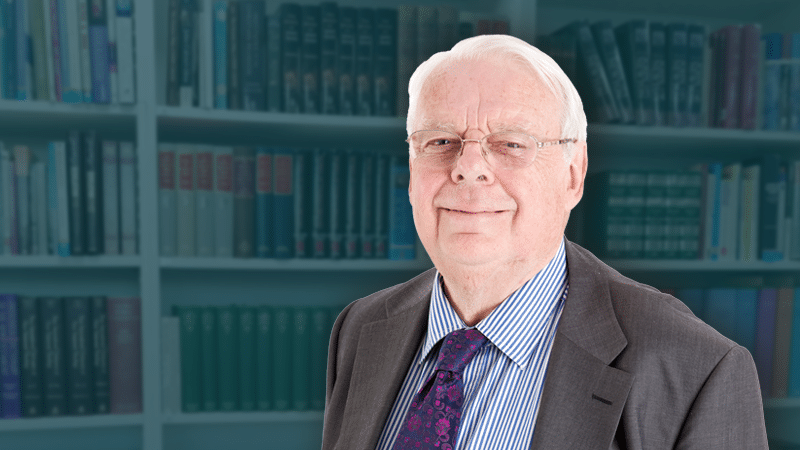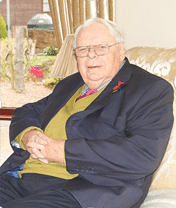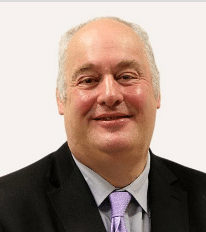John Burn – A tribute from a friend

by Stephen Grant
It was a time of trams, steam trains and booming industry on Tyneside when John was born in Newcastle. Newcastle born and bred, he was nurtured by his father John, who worked at British Ropes; intelligent, well-read and hard-working, encouraging young John intellectually. John’s mother Nancy was a bubbly and vivacious housewife who doted on her new son. Soon after his birth, the calamitous worldwide conflict erupted, helping to shape John’s indomitable spirit. His parents attended Holy Trinity Church, Jesmond, where John’s emerging Christian faith was nurtured.
John enjoyed his time at Heaton Grammar School, going on to become a Bachelor of Science in Chemistry at King’s College, Durham. This was followed in 1959 by his becoming a qualified teacher, earning a PGCE at the University of Bristol. Throughout his life, he was passionate about improving the quality of education, particularly in inner city areas.
He actively sought a role in the newly founded comprehensive school at Kenton, Newcastle. He went on to become a senior leader, firstly at Slatyford and then at Blakelaw – both challenging inner-city schools. In 1979, he was appointed headteacher at Longbenton High School. He radically transformed the school, firstly by ensuring a Christian ethos and secondly embedding it at the heart of the community, starting adult teaching classes alongside those of the students.
From 1983 to 1985, he was part of the Archbishop of Canterbury’s Commission on Urban Priority Areas (Faith in the City), working alongside national figures such as David Sheppard, Bishop of Liverpool and former England and Sussex cricketer. This began John’s influence on the national stage, leading to a meeting with Prime Minister Margaret Thatcher, and eventually to his being awarded an OBE for his services to education in 1993. On the improvement of standards in education nationally, he served on the National Curriculum Council as well as the Schools Examination and Assessment Council, which merged into the School Curriculum and Assessment Authority.
When the Government of the time proposed the setting up of City Technology Colleges, Colin Hart joined forces with John to approach Sir Peter Vardy with a vision for a Christian-ethos school in Gateshead – Emmanuel College. God honoured this vision and under John’s leadership, Emmanuel became an outstanding school. It was non-denominational, founded on biblical principles for an outstanding education. Lord Adonis, in his book, ‘Education, Education, Education’, acknowledges that Emmanuel was one of the schools that inspired the Academy movement through its excellent practice. Colin and John’s vision was multifaceted, as they also founded The Christian Institute at this time.
John, throughout his life, reflecting his strong Christian faith, demonstrably sought to impact the lives of those living in inner-city areas. Emmanuel College was tasked to have at least two-thirds of its intake coming from deprived areas. Subsequent Emmanuel Schools were set up in particularly challenging areas of the country.
‘Loyal, true, warm-hearted’
His passion to provide an outstanding education, particularly for those who might not normally benefit from such, reflected his own plethora of interests in science, history, English, art, music. He loved sport, particularly cricket and rugby. He was a keen theatregoer, loving Shakespeare, but including musical theatre and modern playwrights. He appreciated the great poets such as Milton, John Donne, George Herbert and Gerald Manley-Hopkins. John Betjeman was a particular favourite, with poems such as ‘Christmas’, in which it is asked: “And is it true? And is it true, This most tremendous tale of all, Seen in a stained-glass window’s hue, A Baby in an ox’s stall? The Maker of the stars and sea Become a Child on earth for me?”
He loved visiting art galleries, and classical music. His favourite was Handel’s Messiah; he would attend up to three performances a year. He loved the great hymn writers such as Isaac Watts and Charles Wesley, appreciating their depth of theological teaching. He was a keen bird-watcher and loved visiting places of historical interest. Undergirding this richness of life was his Christian faith.
John was somebody who could relate to anybody, whether on the national stage or in the local community. Whether it be the window cleaner or some prestigious politician, he enjoyed their company. Indeed, he loved meeting people and thrived on social interaction, particularly Christian fellowship. As an Anglican lay reader preaching on Sunday evenings at St Andrew’s Church, Cambois, he enjoyed the fellowship of many in the mining community. At the same time, he served as a lay reader at St Hilda’s, Jesmond, where he was part of the drama group, the singers and so much more.
He was a wonderful friend to so many: loyal, true, warm-hearted. Many would regard him as a mentor, ‘like a father’, due to his wisdom and concern for their good. I have known John for over 50 years, as a close friend of my father and mother, and to myself, and as a fatherly figure to my children. What a privilege to have known such a great man, who never rested on his laurels but rather was concerned with doing one’s best – particularly through knowing Christ. He will be a great miss and his loss is felt deeply.
Stephen Grant is a school governor and former senior teacher.


